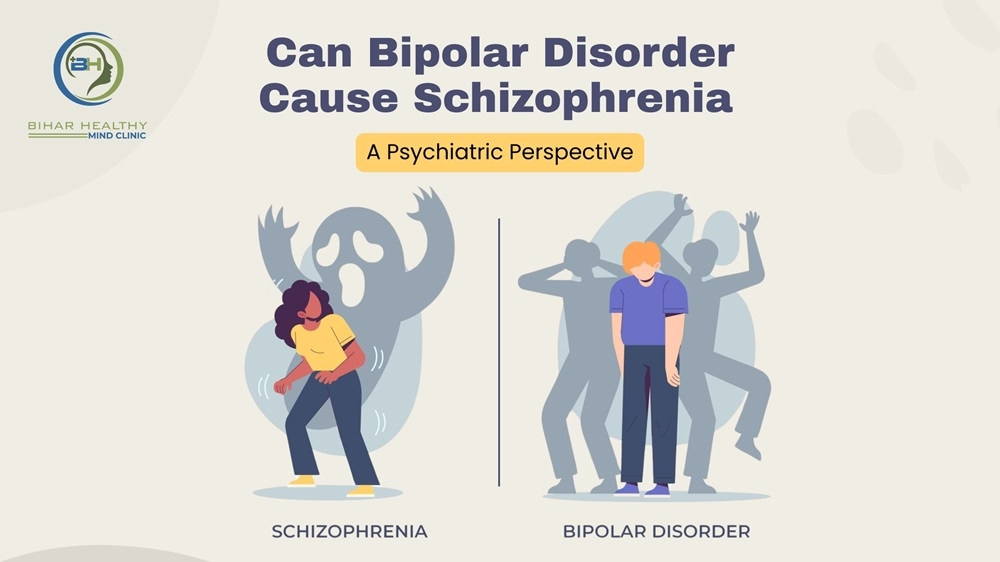
Mental health conditions often raise questions that spark curiosity and concern. One of the most common queries people have is whether bipolar disorder can cause schizophrenia. Both conditions are serious psychiatric illnesses, but they differ in their symptoms, causes, and treatment approaches. At Patna Psychiatry, under the guidance of Dr. Saurabh Kumar, MD (Psychiatry), individuals receive structured evaluation and treatment tailored to their unique needs. This blog aims to clarify the relationship between these two conditions, while also addressing misconceptions such as the term “manic schizophrenia”.
Understanding Bipolar Disorder
Bipolar disorder is a mental health condition marked by shifts between manic phases (increased energy, heightened mood, impulsive actions) and depressive phases (low energy, sadness, and feelings of hopelessness). These shifts can significantly disrupt daily life, relationships, and work performance. Importantly, bipolar disorder does not always follow a predictable cycle, some individuals may experience rapid mood changes, while others have prolonged periods of stability between episodes.
Management usually requires a mix of mood-stabilizing medication, therapeutic counseling, and healthy lifestyle adjustments. Early diagnosis is essential to prevent complications like substance abuse, financial issues, and strained relationships.
Understanding Schizophrenia
Schizophrenia is a chronic psychiatric disorder that primarily affects thought processes, perception, and behavior. Individuals living with schizophrenia often face symptoms such as delusions, hallucinations, confused speech, and difficulty performing daily activities. Unlike bipolar disorder, schizophrenia is not primarily about mood swings but about disturbances in reality testing and cognition.
Treatment usually includes antipsychotic medications, supportive therapy, and psychosocial interventions to help patients manage symptoms and improve quality of life.
Can Bipolar Disorder Turn Into Schizophrenia?
The short answer is no, bipolar disorder does not directly cause schizophrenia. However, both disorders belong to the spectrum of severe mental illnesses and can share overlapping symptoms. For example:
During manic episodes in bipolar disorder, a person may have psychotic features such as hallucinations or delusions, which resemble schizophrenia.
Individuals with schizophrenia may also show mood disturbances that mimic depression or mania.
This overlap sometimes leads to confusion, giving rise to terms like manic schizophrenia, which is not a recognized diagnosis in modern psychiatry but often used informally to describe such mixed presentations.
Schizoaffective Disorder - The Middle Ground
Schizoaffective disorder is described as an illness that blends aspects of bipolar disorder with features of schizophrenia. People with schizoaffective disorder experience symptoms of both conditions: psychosis similar to schizophrenia and mood episodes resembling bipolar disorder.
This diagnosis highlights why people often wonder whether bipolar disorder can evolve into schizophrenia. In reality, they remain separate conditions, but schizoaffective disorder shows how their symptoms can sometimes merge.
Risk Factors and Shared Causes
-
Although bipolar disorder and schizophrenia are distinct, research shows they may share some risk factors:
- Genetics: Both disorders run in families, suggesting a genetic predisposition.
- Brain Chemistry: Disturbances in key neurotransmitters like dopamine and serotonin are linked to the development of both illnesses.
- Environmental Stressors: Trauma, substance abuse, and major life stressors can trigger episodes in susceptible individuals.
- Early-Onset Symptoms: Difficulties in adolescence such as social withdrawal or mood instability, may precede either condition.
Importance of Early Diagnosis
Misdiagnosis is common, especially when symptoms overlap. A patient experiencing mania with psychotic features might initially be mistaken for schizophrenia. Similarly, a person with schizophrenia who also experiences mood swings could be misdiagnosed with bipolar disorder.
At Patna Psychiatry, comprehensive assessments are performed to distinguish between these conditions. Dr. Saurabh Kumar’s expertise as the Best psychiatrist in Patna ensures that patients receive the correct diagnosis and personalized care plans.
Treatment Approaches
-
While treatments differ, both disorders require long-term management:
- For Bipolar Disorder: Mood stabilizers (like lithium), psychotherapy, lifestyle adjustments, and sometimes antipsychotics during severe episodes.
- For Schizophrenia: Antipsychotic medications, cognitive behavioral therapy (CBT), and community support programs.
- For Schizoaffective Disorder: A combination of mood stabilizers and antipsychotics, with ongoing therapy.
Consistent follow-up is crucial since relapse is common without proper treatment adherence.
Dispelling the Myth of “Manic Schizophrenia”
The phrase manic schizophrenia often surfaces when people witness a combination of manic energy and psychotic behavior. However, psychiatry recognizes that these are separate conditions. Using this term loosely may cause confusion and delay proper treatment. Instead, recognizing whether the symptoms point toward bipolar disorder with psychosis, schizophrenia, or schizoaffective disorder is essential for effective care.
Living with Bipolar Disorder or Schizophrenia
Although both conditions are challenging, they are manageable with the right treatment and support. Patients can lead fulfilling lives, pursue careers, and maintain relationships. Early intervention, ongoing therapy, and strong social support networks make a significant difference in recovery.
Family involvement also plays a key role. Loved ones should be educated about the nature of the illness, relapse warning signs, and the importance of medication adherence.
Conclusion
So, can bipolar disorder cause schizophrenia? No, while they share certain features and may overlap, they are distinct psychiatric conditions. Misunderstandings such as “manic schizophrenia” can blur the lines, but accurate diagnosis is crucial for effective treatment.
At Patna Psychiatry, under the guidance of Dr. Saurabh Kumar, MD (Psychiatry), patients receive evidence-based care tailored to their condition, whether it is bipolar disorder, schizophrenia, or schizoaffective disorder. Seeking timely help from the Best psychiatrist in Patna ensures that individuals and their families can find hope, recovery, and long-term stability.
Disclaimer: All characters and events depicted in this blog are entirely fictional. Any resemblance to actual persons, living or dead, is purely coincidental. The content is intended for informational purposes only and should not be considered as medical advice. Always consult a qualified healthcare professional for medical concerns.
Visitors: 192





No comments yet.